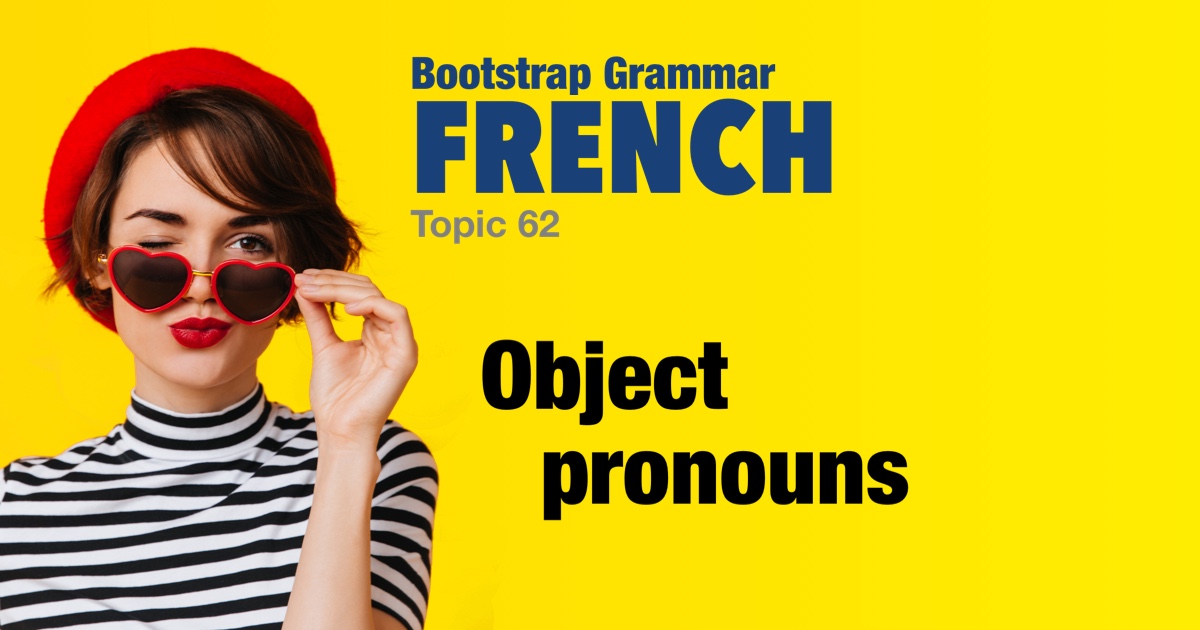French grammar - Object pronouns |
|||
|
|||
We saw that the personal adjectives (je, tu, il etc.) refer to the a person or people who are the subject of a sentence. When referring to a person, animal or thing that is the object of a sentence, we use a (direct) object pronoun. The French direct object pronouns are: • je ⇒ me: 'me' • tu ⇒ te : 'you' (familiar) • il & on ⇒ le : 'him' or 'it' • elle ⇒ la : 'her' or 'it' • nous ⇒ nous : 'us' • vous ⇒ vous : 'you' (formal & plural) • ils & elle ⇒ les : 'them' Those that end in a vowel all contract with an apostrophe when followed by a word beginning with a vowel. So me ⇒ m' etc. For inanimate things ('it'), whether we use le or la depends on the gender of said object. The object pronoun comes immediately before the verb that acts upon it. -- This is unlike in English where the pronoun comes after the verb. |
| Examples: | |
|
Je vous aime bien.
I like you (formal).
|
|
|
Tu m'aimes ?
Do you (familiar) love me?
|
|
|
Pouvez-vous nous voir ?
Can you (formal) see us? |
|
|
Oui, je vous vois.
Yes, I see you (plural). |
|
|
Où est Christine ? Qui peut la voir ?
Where is Christine? Who can see her?
|
|
|
Je la vois.
I see her. |
|
|
Où sont les clés ? Qui les voit ?
Where are the keys? Who sees them? |
|
|
Je les vois là-bas.
I see them over there. |
|
|
Maman, papa, vous nous regardez ?
Mom, Dad, are you (formal) watching us? |
|
|
Oui, nous vous regardons.
Yes, we are watching you (plural). |
|
|
Les Français sont sympathiques. Je les aime bien.
The French are friendly. I like them. |
|
|
C'est un raisin. Je peux le manger ?
It's a grape. Can I eat it?
|
|
|
Ce croissant - je peux le manger ?
That croissant - can I eat it? |
|
|
Tu veux le manger ?
Do you (familiar) want to eat it? |
|
|
Désolé, je le mange.
Sorry - I am eating it. |
|
|
Qui porte la valise lourde ? Il la porte.
Who is carrying the heavy suitcase? He is carrying it. |
|
|
Est-ce qu'il la porte ?
Is he carrying it (female)? |
|
|
Pourquoi le portez-vous ?
Why are you (formal) carrying it? |
|
|
Son numéro de téléphone - l'avez-vous ?
His telephone number - do you (formal) have it?
|
|
|
Je l'écris dans le cahier.
I write it in the notebook. |
|
|
Il l'invite à la fête.
He is inviting her to the party.
|
|
|
Ces chaussures - je les achète.
These shoes - I am buying them.
|
|
|
Je regarde ce film. Bénédicte le regarde aussi.
I am watching this movie. Bénédicte is watching it too. |
|
 |
|



 Used in this way
Used in this way 